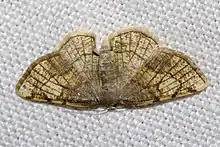Abraxini
The Abraxini are a tribe of geometer moths in the subfamily Ennominae. Here, the Cassymini are considered a specialized offshoot of the Abraxini and merged therein; some authors consider them a distinct tribe however.[2]
| Abraxini | |
|---|---|
 | |
| The Dorset cream wave (Stegania trimaculata) is placed in the Cassymini by authors recognizing them as separate tribe | |
| Scientific classification | |
| Domain: | Eukaryota |
| Kingdom: | Animalia |
| Phylum: | Arthropoda |
| Class: | Insecta |
| Order: | Lepidoptera |
| Family: | Geometridae |
| Subfamily: | Ennominae |
| Tribe: | Abraxini Warren, 1893 |
| Genera | |
|
Several, but see text | |
| Synonyms[1] | |
| |
Genera
As numerous ennominae genera have not yet been assigned to a tribe,[3] the genus list is preliminary. Most of the genera listed here would be placed in the Cassymini if these are considered separate.[4]
- Abraxas
- Magpie, Abraxas grossulariata
- Clouded magpie, Abraxas sylvata
- Auzeodes
- Ballantiophora
- Berberodes
- Cassyma
- Danala
- Gyostega
- Heterostegane
- Hydatocapnia
- Leuciris
- Ligdia
- Scorched carpet, Ligdia adustata
- Lomaspilis
- Clouded border, Lomaspilis marginata
- Ninodes
- Orthocabera (tentatively placed here)
- Peratophyga
- Pristostegania
- Protitame
- Pycnostega
- Stegania
- Syngonorthus
- Xenostega
- Zamarada (tentatively placed here)
Heliomata, otherwise placed in the Macariini, might also belong here.
References
- Forum Herbulot (2008)
- Holloway (1994), Young (2008)
- See references in Savela (2008)
- Holloway (1994)
External links
Wikimedia Commons has media related to Abraxini.
- Forum Herbulot (2008): Family group names in Geometridae. Retrieved July 22, 2008.
- Holloway, J.D. (1994): The Moths of Borneo: Family Geometridae, Subfamily Ennominae. London.
- Savela, Markku (2008): Markku Savela's Lepidoptera and some other life forms: Ennominae. Version of March 8, 2008. Retrieved July 21, 2008.
- Young, Catherine J. (2008): Characterisation of the Australian Nacophorini using adult morphology, and phylogeny of the Geometridae based on morphological characters. Zootaxa 1736: 1-141.
This article is issued from Wikipedia. The text is licensed under Creative Commons - Attribution - Sharealike. Additional terms may apply for the media files.